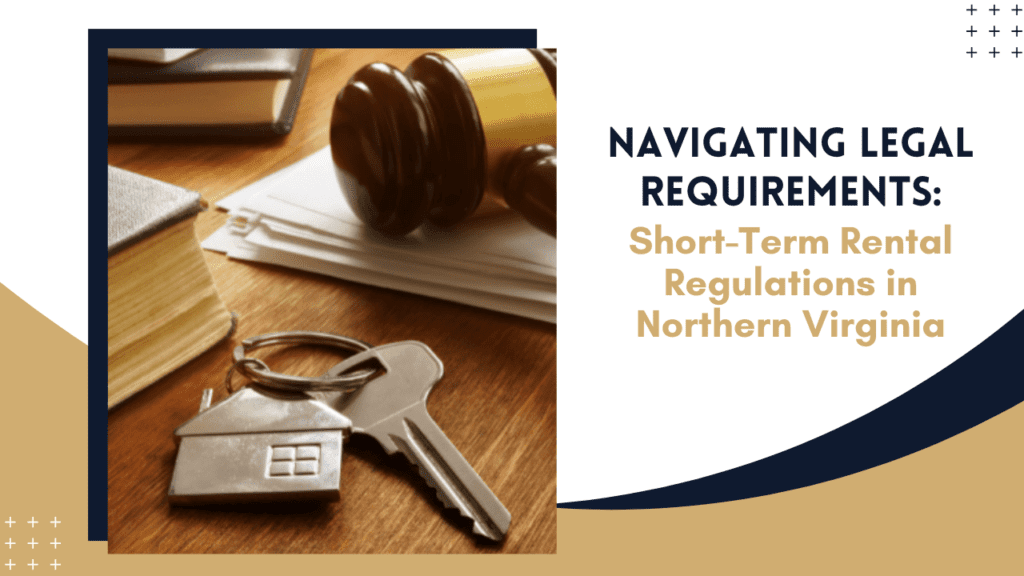
As the short-term rental market flourishes, landlords and real estate investors in Northern Virginia are increasingly seeking to capitalize on this profitable trend. Although platforms like Airbnb and VRBO have revolutionized the way people rent temporary accommodations, they have also brought about a slew of legal ambiguities and concerns.
Whether you are diversifying your real estate portfolio with some short-term rentals or you’ve decided that this is the type of property you want to rent out rather than long-term residential leases, you’ll need to understand the legal requirements in our market. We’re here to shed light on key legal requirements for short-term rental property owners, define what constitutes a short-term rental property, and discuss how partnering with a property management company can assist in navigating the laws and regulations.
Here’s our comprehensive guide for landlords and real estate investors who need to understand and adapt to the legalities governing short-term rentals in Northern Virginia.
Defining a Short-Term Rental Property in Northern Virginia
A short-term rental property (STR) is typically defined as a residential unit rented for a short, pre-determined period of time, typically less than 30 days. Common examples include vacation homes, home-sharing arrangements, and accommodations offered through online platforms such as Airbnb or VRBO. You might also be renting out a property to business professionals or employees who are in town for a series of months, but not a full year.
These properties are generally furnished, and all of the utilities will be included in the rental amount. Short-term rental properties can be very profitable; the per-night cost is higher than the monthly rent on a long-term lease. Remember that your guests in these rental homes will expect amenities and comforts similar to what they find at a hotel, including televisions and internet services, and linens.
In Northern Virginia, each municipality addresses STRs differently, with some using different terminologies to describe these properties. For instance, in Arlington County, they may be referred to as “Accessory Homestays,” while Fairfax County categorizes STRs under “Transient Lodging.”
Property owners and real estate investors should familiarize themselves with the specific terminologies and regulations of the locality in which they operate to ensure compliance with all regional laws. Some areas, such as Fairfax County, are specific about the timeline for STRs. The laws will only apply to those rentals that host guests for fewer than 30 days.
Legal Requirements for Short-Term Rental Property Owners
In the context of Northern Virginia, the legal requirements for short-term rental (STR) properties tend to vary between specific counties and cities. If you have a short-term rental in Alexandria and another one in Reston or Manassas, you might find that the rules are slightly different. However, there are several commonalities that landlords and investors should be aware of when we’re talking about Northern Virginia’s rental market in general and the requirements for short-term rental properties.
- Business License. Operating an STR typically requires the owner to obtain a business license, which ensures that the rental unit complies with local regulations and adds legitimacy to the business.
- Zoning Restrictions. Residential zoning requirements often restrict or limit the duration of STRs, and may also dictate the maximum number of occupants. Fairfax County, for example, restricts the number of adults to six in any short-term space. It is crucial for property owners to review and understand the local zoning ordinances to avoid penalties. In some cases, a zoning tax or fee may be required.
- Permits and Inspections. Depending on where you’re renting out a property in the short term, you might be required to acquire specific permits, undergo property inspections, or address additional safety regulations, such as installing fire alarms and carbon monoxide detectors. In some cities, such as Alexandria, owners will simply have to register their short-term rental property with the city.
- Paying Taxes. It’s very important to understand what your tax obligations are when you’re renting out a property for fewer than 60 or 30 days at a time. STR owners are generally obligated to collect and remit taxes, including occupancy taxes and sales taxes, from tenants. These taxes can vary between states and localities, and it is essential to understand your tax liabilities. In many cities, transient lodging taxes are applied to short-term rentals in addition to the sales or service tax that’s charged. In Fairfax County, there’s a 7% transient tax and a 1% sales tax on STRs.
- Homeowners Association (HOA) Requirements. In areas governed by an HOA, owners should be diligent about reviewing and adhering to the association’s rules and regulations, which may prohibit or limit STRs within the community.
Generally, Northern Virginia short-term rental laws are similar from county to county and city to city. There are nuances, however, so make sure you’re aware of the requirements and responsibilities.
Property Management Companies: Guiding Owners Through Laws and Regulations
 Given the often complex and detailed landscape of short-term rental regulations in Northern Virginia, many landlords and investors are turning to property management companies to help navigate the legal and operational challenges. This is an excellent idea. It reduces your risk. Professional property management companies can provide valuable assistance in numerous ways.
Given the often complex and detailed landscape of short-term rental regulations in Northern Virginia, many landlords and investors are turning to property management companies to help navigate the legal and operational challenges. This is an excellent idea. It reduces your risk. Professional property management companies can provide valuable assistance in numerous ways.
Most importantly, you can count on receiving updates and excellent communication when your property manager is renting out your short-term home and working with guests. You’ll also be able to leverage their expertise. Thorough knowledge of local legal requirements is vital, as is staying updated on any regulatory changes. A reliable property management company can offer both expertise and timely updates, ensuring your STR remains compliant with the latest regulations.
You can also worry less about the permits and inspections that are required. Property managers can assist in acquiring the necessary permits and inspections for any of your short-term rental properties.
We are an experienced Northern Virginia property management company, and we’d be happy to help you work through the necessities of establishing your short-term rental and effectively renting it out to guests. Please contact us at Comfort Property Management. We lease, manage, and maintain investment properties throughout Northern Virginia, in Arlington, Alexandria, Fairfax, Falls Church, McLean, Ashburn, Sterling, Springfield, Reston, Chantilly, Manassas, Centreville, and Herndon.
